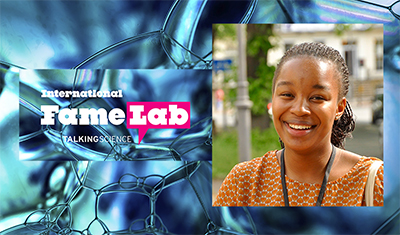 FameLab was established in 2005 to give young professionals working in the sciences the opportunity to showcase their work and improve their ability to engage the media and public audiences with science. The initiative has since grown to include 25 countries around the world, including South Africa, where Nozipho was the first black South African female winner of the competition in the country. She subsequently reached the global final at the Cheltenham Science Festival.
FameLab was established in 2005 to give young professionals working in the sciences the opportunity to showcase their work and improve their ability to engage the media and public audiences with science. The initiative has since grown to include 25 countries around the world, including South Africa, where Nozipho was the first black South African female winner of the competition in the country. She subsequently reached the global final at the Cheltenham Science Festival.
She is working on research that could have a huge impact on communities across Africa, using nanotechnology to remove pollutants from water. Nanoscience is the study of structures and materials on the scale of nanometres (or a millionth of a millimetre). Working at this painstakingly intricate scale, Nozipho has developed a new water filter that will remove micropollutants, caused by industrial pollution, hormones, cosmetics, and pharmaceutical drugs, from water sources. As well as saving lives across the continent, this new technology could also be sold around the world, boosting the South African economy.
In South Africa, FameLab (an initiative of the Cheltenham Festival), has a strong development agenda, with masterclasses led by communications specialists training scientists and researchers, “narrowing the gap” and inspiring audiences across the country.
Nozipho has big dreams and hopes for a world that is free of water scarcity and poor-quality water. She is currently based at the Karlsruhe Institute of Technology in Germany as an exchange student, where she is advancing her PhD studies.
“After participating in the FameLab competition this year, life has never been the same for me! I’ve done several radio and television interviews in South Africa, and was recently recognised by the South African news source, the Mail & Guardian, in its 200 Young South Africans supplement for 2016,” Gumbi says.
And the British Council’s work with young female scientists in Africa does not stop there. The Newton Fund encourages research collaboration on development topics with more than 200 early career female researchers visiting the UK in the last three years. A study tour to the UK that will see participants visit institutions including Imperial College London, Oxford University and the Wellcome Trust will take place in late October.
*Submitted by Virginia McManus
Publish date: 2016-09-29 00:00:00.0